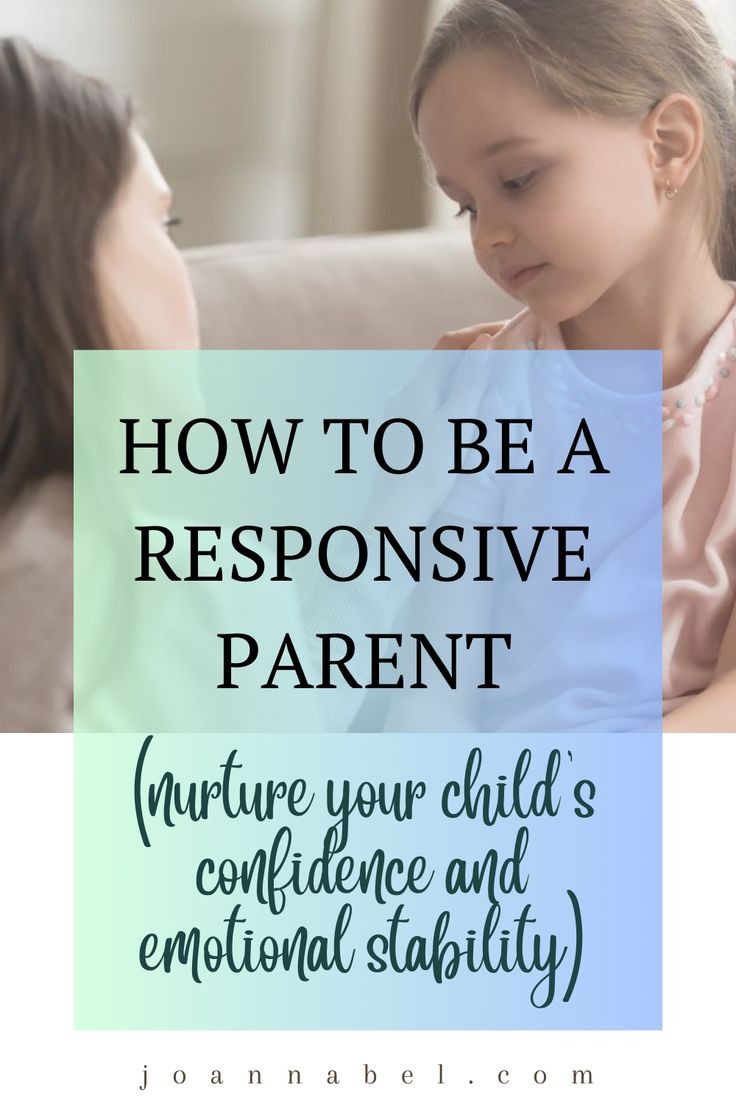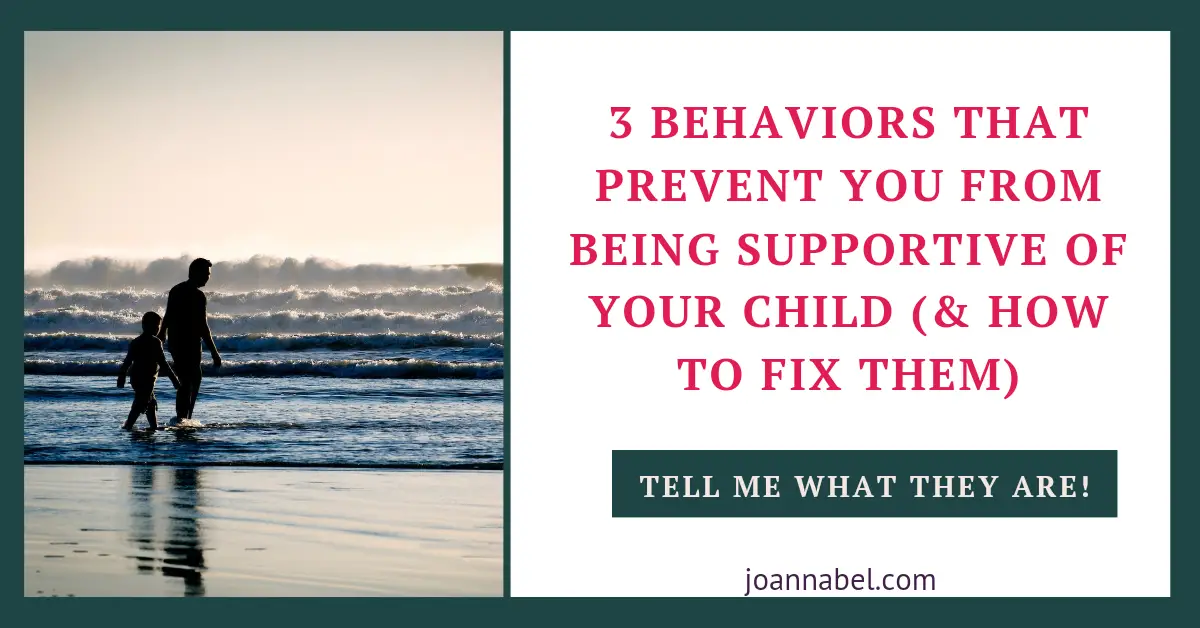Learning how to be a responsive parent is key to raising emotionally healthy, self-assured children with a solid sense of self-worth. Responsive parenting involves understanding your child’s needs, respecting their individuality and personality, and guiding them with empathy and consistency.

How To Be A Responsive Parent
In this post, we’ll share actionable tips to help you foster a strong emotional connection with your child, meet their developmental needs, and create a nurturing environment where they can thrive. No matter if you’re new to parenting or refining your approach, these guidelines on how to be a responsive parent will help you become the best parent your child needs.
Let’s dive in.
Note: Although I am a Clinical Social Worker, engaging with this website does not establish a professional social worker-client relationship. The information provided here is for general purposes only and should not be considered professional advice. While we strive to ensure accuracy and reliability, this content is not a substitute for professional guidance. For specific concerns, issues, or situations, it is essential to consult a qualified professional and present your situation. Read the full Disclaimer here.
WHAT RESPONSIVE PARENTING IS
Responsive parenting means being attentive to the child’s emotional and other needs by being sensitive and sensible (perceptive) to what the child requires and providing a response suitable for the child’s developmental phase.
This means that to be able to respond optimally, you need to show empathy – be receptive to the child’s emotions, and decenter – understand their point of view (separately from your point of view). And you need to recognize if the response is suitable for the child’s developmental phase.
When you become a responsive parent you:
- acknowledge a child’s unique position (concerning positions of power, dependence, developmental stage, etc),
- you show interest in the child’s perception (point of view) and their emotions
- and you’re respecting their perception and their emotions.
With emotionally warm and responsive parenting, children are certain they’re loved, cherished, and respected enough as persons, as human beings. The dimension called ”emotional warmth and responsiveness” is one of the several parenting capacity dimensions.
Then this in combination with the right amount of positive discipline and proper guidance and structure from a parent leads to more stability, confidence, stronger identity, solid integrity, more functional relationships, personal and social responsibility in children, and more!
WHY IT’S IMPORTANT TO BE A RESPONSIVE PARENT
Responsive parenting is important because it meets a child’s core emotional needs for connection, security, and validation, fostering their emotional, social, and psychological development. By being emotionally warm, empathetic, and consistent, parents help children build self-worth, trust, and resilience, setting the foundation for lifelong well-being and healthy relationships.
For more details about the main 7 reasons why responsive parenting is important, read my post Why Is Responsive Parenting Important For Raising Emotionally Healthy Children?.

HOW PARENTS CAN BE RESPONSIVE TOWARD THEIR CHILDREN?
Parents can be or become more responsive toward their child if they achieve good-enough responsiveness, which assumes quick, well-timed, consistent, suitable actions and activities directed and targeted to answer to the needs of the child.
This doesn’t mean you’ll be able or that you have to always excel at everything in every moment. And you’ll make mistakes and learn along the way as everyone does.
Also, it’s not possible to satisfy every child’s need at every moment, and it’s not even advisable. Parenting is situational.
As we already stated, responsive parenting makes children feel appreciated, loved, and cherished, so here are some general guidelines to help you in making sure children feel you’re emotionally warm and responsive as a parent.
#1 RESPONSIVE PARENTS SHOW THEY CARE
It’s quite logical because all of us want and need to feel appreciated, loved, and accepted. We all want to feel safe enough and to have control of our lives. Kids are no different.
I think we all know most of these things (or we at least think so). It’s practically self-explanatory, but it’s always a good thing to remember them and talk about them. There are so many children out there who’re not lucky to experience all of this:
Express your emotions and support them in expressing theirs.
Communicate openly and appropriately, and according to their age and maturity.
Hug them, touch them and kiss them in a way comfortable for them, and let them do the same.
Make them feel safe and protected.
Avoid overprotecting them.
Help them gain more and more independence as they mature.
Help them open up.Trust them (demonstrate this).
Make them feel worthy and respected.
You teach and show them in your example what it means to be responsible.
Ask them what they need and listen.
These sound so simple to do, but still how many times in life you’ve needed this but didn’t get it?
Be cognizant of this. And if you need a small push towards showing your child you care, check out my post How to Show Your Child You Care: 50 Transformational tips.
Let’s move to the next.
#2 RESPONSIVE PARENTS KNOW HOW TO SELF-REGULATE IN MANAGING MISTAKES AND MISBEHAVIOR
Your attitude towards mistakes and failures is important because you are modeling it for the kids. But also, usually the criteria we put on kids can even be higher than for adults, because the ingrained belief that children are there just to obey (anyone, anytime) is so common, and it’s not even quite conscious.
This breaks my heart so often, especially when it’s killing the child-parent relationship. So generally speaking, too much strictness is almost NEVER good and it’s ineffective. Especially in the long run.
At the same time, too much permissiveness, reflected in weak boundaries and discipline, is the opposite extreme you don’t want, too.
If you want to know more about the consequences too strict and too permissive parenting styles have on kids, you can find it in my post about 5 parenting styles.
So let’s see a few simple guidelines on mistakes and misbehavior now:
Avoid taking their mistake or action too personally. Practice distancing from being too emotionally attached to their mistakes.
Correct them when they’re wrong and teach them how to do things properly without cruelty and harm.
Make sure they understand that reaching for punishment doesn’t mean you love them less than before. (If it’s necessary to use punishment.)
Make sure they understand the reason they’re being punished.
Your punishment needs to be equally weighted to the mistake they made.
Avoid intimidating them when they did something wrong. You should rather try to explain so they understand the consequences of their actions. And if they are too young for certain explanations, then yelling doesn’t have a point even more.
Be comforting enough encourage them and motivate them.
Acknowledge it and congratulate them when they succeeded.
#3 RESPONSIVE PARENTS ARE TRANSPARENT WITH THEIR KIDS
People will say this always sounds very nice but that’s not realistic, right? You’ve heard this a hundred times. But is it unrealistic, tough? Is ignorance really bliss?
I encourage you to think about how you would feel if you were your kids when you’re keeping important things from them. Things that affect their lives, the changes, the big family problems that all of you live with every day.
The thing is nobody can protect anybody from their own experience, good or bad, and if we don’t talk about what’s going, on it doesn’t mean that is not going on and that we don’t all witness it. Just help the kids integrate things in their heads and in their hearts. And set a good example by doing it.
Just remember this:
Find a decent and age-appropriate way to tell them the truth so they understand what is happening around them.
Avoid hiding the problems from them. Instead, find a way to make them understand. Or really make them not worry if they’re too young to understand everything completely, by explaining the parts that affect them.
Because if they don’t understand and they (pretty much always) feel something is wrong, they will worry, show anxiety, and fear even more.
Avoid seeing and using the method of buying them off or bribing them as a common parental skill.
WHEN IN DOUBT ABOUT TRANSPARENCY AND HONESTY
Now, this topic can cause certain confusion or doubt, because we all know those messages saying we should protect our kids from all harm and all that. And while that’s true in general or as a principle, that’s not to be taken as it’s said (literally).
So like most things, we need to balance things out, use common sense criteria, measure a bit, think about our situation, causes and consequence, etc.
What can help to put your situation in perspective is asking yourself:
- Does a child have a right to know?
- What happens if a child doesn’t know about it?
- Which harm is bigger in the long run?
- Are you sure there’s no harm in keeping it from them?
- Is a child going to be in an unbearable state of not knowing what’s happening? Observe a child’s behavior – is a child showing signs of anxiety, fear, even agony, etc?
- Does a child already know but it’s just you who can’t talk to them about their thought and feelings?
- Always think about what/who are you actually protecting here? Is it them or something else?
- Do your kids leave in delusion? Is this affecting their perception of your family life or even the world? Are they being unrealistic about their wants and desires because of it?
And so on and so forth. You don’t have to stop just with these questions, of course.

If a child is young, always remember that not knowing and not understanding what’s happening at all, can get to cause more harm than good because kids don’t have anywhere else to turn except you.
The kids can experience psychological issues or different psychosomatic consequences because they don’t feel safe. Just don’t ignore the elephant in the room, because usually all family members already know it’s there.
Just talk to your kids in an age-appropriate non-harming manner about things that affect their lives. This will calm them down and the whole family needs that.
#4 RESPONSIVE PARENTS ENCOURAGE FREEDOM, INCLUSIVENESS, AND PARTICIPATION
When I say freedom I mean the sense of being free to explore things and life. To enjoy and not live in fear. To learn to do things in their own way. To become more and more independent.
Also some personal physical space and space for expressing themselves belongs here. A place where they can be who they are and be accepted for it. But at the same time have clear limitations that are good for everyone because this way they learn how to differentiate right from wrong.
So it’s clear now that freedom goes hand in hand with inclusiveness and participation. They should feel included in their own homes, but also in the community, in society, and this is sometimes troubling.
The reasons why some families can be and feel excluded (margunalized) can be ethnic, financial (poverty), demographic, personal characteristics such as gender, a certain disability or sexual orientation, and some/all of it combined, etc. See more about intersectionality here.
It can get pretty complex, which is why we should never give up fighting for our freedom and rights, but also the rights of others. Considering that all of it takes a toll on our kids.
The more exclusive the society is, the more risk there is for an individual kid to be harassed, unhappy, or lonely. And an adult in general, too.
PARTICIPATION AS A QUESTION AND A SOLUTION
When it comes to participation, this is one of my favorite topics on this planet of ours! The reason for it is the fact that if anything can change the world that’s participation for sure! If anyone could have a saying about things that affect their life, our world would be a better, safer, and more free place.

This is especially the case for children, because, throughout a child’s childhood, any child can count maybe a couple of times (if any) when they had a saying in things that are happening around them.
And it’s super important because kids:
- do have an opinion,
- are very reasonable,
- and the most important thing is, they know what they’re talking about because they live their lives every day!
Try to remember your childhood. How many times have adults asked you what do you think should be done (and actually LISTENED!) about for example your school program, your teachers, your community, neighborhood, etc?
They know how they feel or what they think about things that are happening to them. And they’re waiting for the adults to give them the opportunity to express themselves and then take them into consideration.
Kids’ insights are precious.
And the biggest issue here is that our societies are not yet developed enough because their mindset hasn’t yet come to accept this. Even though since 1989 (article 12 of the UN Convention on the Rights of the Child), we are obligated to treat children as competent individuals and respect a child’s right to participate in all decision-making that affects their lives.
And now let’s see just a few guidelines I wrote for you concerning this:
Avoid teaching them they should fear the world around them too much. Rather you teach them what it means to be careful, conscious, and cautious. And to confront their fears.
They’ll learn from your behavior the best. Be mindful of your actions and reactions.
Stay reliable and dependable so they know they will be safe.
Encourage their participation in decision-making and events whenever you can because this is a sign of respect and validation.
Help them shape their cultural and other identities.
Make them feel loved, respected, and valuable in situations when their identity intersects with age, race, religion, sexuality, disability, etc.
If you find these guidelines I provided for you useful check out the extended version in my blog post How to Show Your Child You Care.
Latest Posts:
- Special Gifts to Let Someone Know You’re Thinking of Them (13)

- 100 Ways to Challenge Yourself (Without Stretching Yourself Too Thin)

- What To Do When Your Parent Struggles With Alcohol

- How To Navigate Moving to a New Home With Your Kids

- Prenups for Young Couples (A Modern Approach)

- What Happens When You Sign A Prenup (Relationship-Wise + Legally)

FINAL THOUGHTS ON BEING A RESPONSIVE PARENT
Responsive parenting is not about being perfect—it’s about being present, empathetic, and intentional in your approach to your child’s needs. By staying emotionally warm, setting appropriate (flexible) boundaries, and fostering open communication, you’re giving your child the foundation they need to grow into a well-adjust, confident, resilient individual.
Remember, small, consistent steps matter if you’re trying to be a responsive parent. Start by choosing one strategy from this post to implement in your daily interactions and see how it strengthens your bond with your child.
If you’re looking to dive deeper, check out my related posts:









Leave a Reply